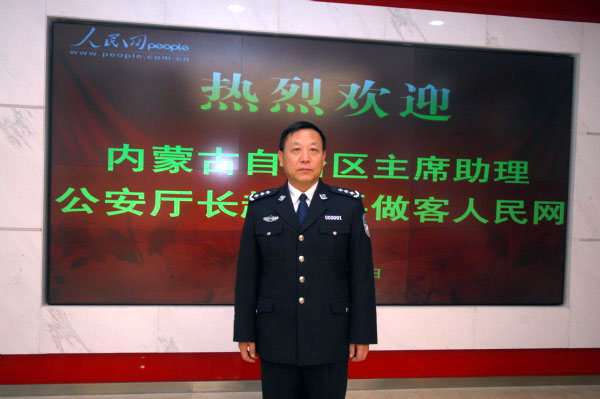 |
|
|
Zhao Liping, Assistant Chairman of Inner Mongolia Autonomous Region, Director of Inner Mongolia Autonomous Region Public Security Bureau talks at the "Frontier Area Surveillance, Control and Stability" Forum by the People's Daily.
|
The following is an interview of Mr.Zhao Liping, Assistant Chairman of Inner Mongolia Autonomous Region and Director of Public Security Bureau of Inner Mongolia Autonomous Region, at the "Frontier Area Surveillance, Control and Stability" Forum by the Chinese official press People's Daily. The original interview in Chinese can be seen here:
http://tv.people.com.cn/GB/14644/10508401.html
People's Daily correspondent Yang Yan:
Inner Mongolia is the northern frontier of our mother country (China), as well as one of the defensive layer provinces of the capital. What are the special characteristics and importance of Public Security works in Inner Mongolia?
Zhao Liping:
Special characteristics of Public Security works in Inner Mongolia are: First, Inner Mongolia is a nationality (minority) area; second, it is a frontier area with frontier area characteristics. In addition to some common issues including security, stability, and public order that are common in other areas, Inner Mongolia, Xinjiang and Tibet are not different. The main issue is ethnic problem, ethnic relationship and ethnic conflict. Certain Western hostile forces are carrying out two types of activities against us: Westernization and splitism. Westernization is to impose western values, western political and social system on us; splitism is to split China. So, to split China where do they start? Of course they start from the minority areas. As you all know, some incidents which took place in Xinjiang and Tibet are examples of splitism. Inner Mongolia also has the same problem. Hostile forces are attempting to separate Inner Mongolia, trying to carry out splitism. These types of activities have always been there in Inner Mongolia. But why haven’t they succeeded? They can’t succeed because we do not allow it, the Public Security authorities will not permit it. They didn’t succeed because the Pubic Security authorities did their job well.
Zhao Liping:
Our policy towards such problems is to take preemptive and aggressive approaches to prevent things from happening and block being hit before reacting. For years, we have always taken preemptive strikes. Once we discover any sign, we always preemptively punish them so that they will not become a force. Before you even try to start your splitism we have already cracked down on you. Even before you attempt to instigate the public to carry out your activities, we would have sufficient resources to rally the public so that the general public will not follow you. All nationalities follow the Chinese Communist Party and recognize themselves as Chinese nationalities (zhong hua min zu). Therefore they don’t have the resources. They don’t have a market.
For example, if you try to carry out any sabotage, we would literally “find out the plan even before the enemy acts”. Once we know of it, we would apply “surgery”. “Know the enemy and know yourself, and you can fight one hundred battles with no risk of defeat.” We have always tried to know the enemy well but not let the enemy know us. There are certain number of forces and certain number of groups attempting to separate Inner Mongolia. But the Public Security authorities are far stronger than them. They don’t have the strength to hit back. I have the preemptive strength and dominant power to maintain state security and social stability in hand, so you will lose. For these many years, separatist organizations of Inner Mongolia have not succeeded making a louder noise. That’s not because they don’t want to succeed, but they can’t succeed.







